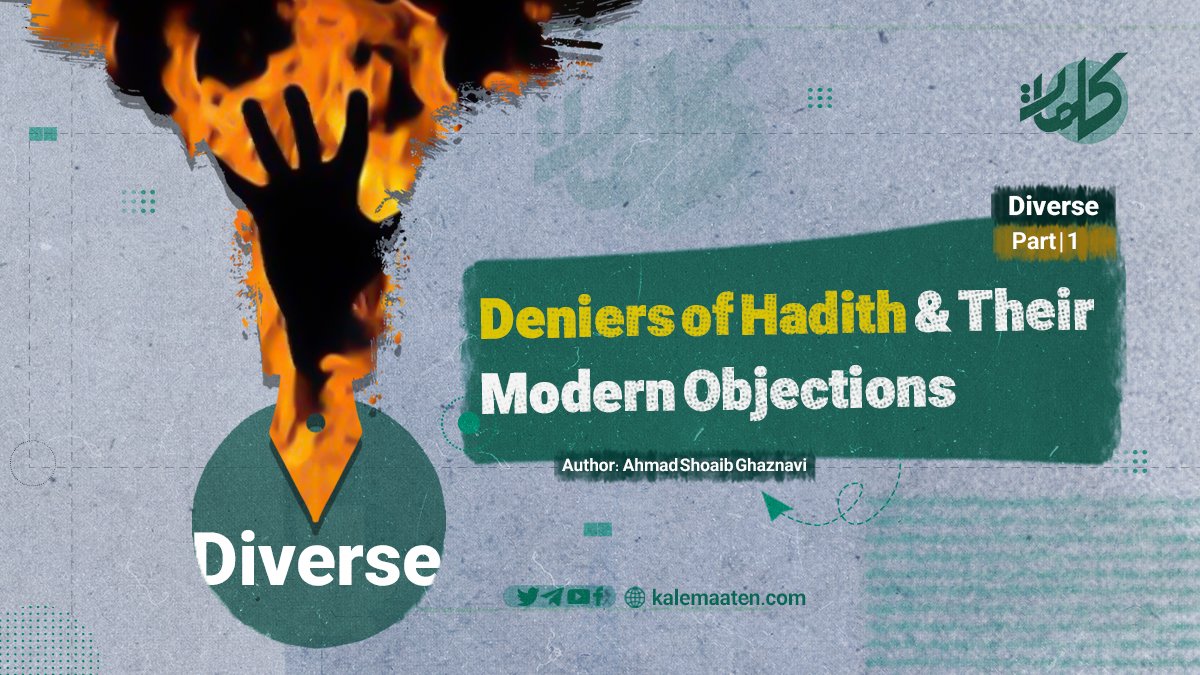
Author: Ahmad Shoaib Ghaznavi
Deniers of Hadith and Their Modern Objections (Part One)
Abstract
The inclination towards Quran-onlyism and the rejection of the Sunnah, known as the sect of “Quranists,” is neither a new nor unprecedented phenomenon. This topic has been a significant subject in scholarly circles and has experienced ups and downs throughout Islamic history. This movement has consistently taken either an extreme or neglectful stance regarding the status of Sunnah. Some believe that religious matters should be understood solely through the Quran, leading them to deny the authority of all Hadiths. This group considers narrations invalid and relies solely on the Quran for religious guidance.
Introduction:
Allah, the Exalted, in His infinite wisdom and mercy, willed to rescue humanity from the darkness of disbelief and ignorance and to liberate them from the chains of illusions and superstitions. For this purpose, He revealed the final divine book, the Holy Quran, to His purest servant, Muhammad Mustafa (PBUH), and assigned him the mission of conveying this book to the people:
“وَأَنْزَلْنا إِلَيْكَ الذِّكْرَ لِتُبَيِّنَ لِلنَّاسِ مَا نُزِّلَ إِلَيْهِمْ” And We revealed to you the message so that you may clarify for the people what has been sent down to them.
Furthermore, Allah commanded all Muslims to follow the teachings and purified Sunnah of the Prophet (PBUH), as his words and actions are based on divine wisdom and revelation, free from personal desire: وَمَا يَنْطِقُ عَنِ الْهَوَى إِنْ هُوَ إِلَّا وَحْيٌ يُوحَى” He does not speak out of desire; it is nothing, but revelation sent down to him.
Thus, adherence to the Hadith and Sunnah of the Prophet (PBUH) is akin to following the Holy Quran and Allah, the Exalted: “وَما آتاكُمُ الرَّسُولُ فَخُذُوهُ وَما نَهاكُمْ عَنْهُ فَانْتَهُوا” Whatever the Messenger gives you, take it; and whatever he forbids you, abstain from it.
Accordingly, after the Quran, the Hadith forms the second most significant foundation for the lives of Muslims. Many Islamic rulings have been elucidated solely through the statements of the Prophet (PBUH). Consequently, Islamic Shariah is built upon two primary sources: the Holy Quran and the Prophetic Sunnah.
Imam Shah Waliullah Dehlavi emphasized the importance of Hadith and Sunnah, saying: “Hadiths are like radiant lamps and the full moon of the fourteenth night. Whoever follows them will be rightly guided, and whoever turns away from them will go astray and fall into ruin.”
Thus, in terms of obligatory adherence and divine origin, the Sunnah holds the second rank after the Quran. The Companions of the Prophet (PBUH) did not distinguish between rulings established by the Quran and those established by the Sunnah. The difference lies in the fact that the Quran’s words and meanings are directly from Allah, while in the Sunnah, the meanings are from Allah, but the words are from the Prophet (PBUH).
The Beginning of the Denial of Hadith:
The denial of Sunnah, known as the “Fitnah of Denial of Sunnah,” began with the martyrdom of Umar ibn al-Khattab (MABH). His assassination, which was like a sturdy barrier against discord, led to a wave of conflicts and the emergence of various factions in the Islamic world. These factions, under the slogan “Hasbuna Kitab Allah” (The Book of Allah is sufficient for us), opposed the Sunnah, rejecting it as the second source of Islamic legislation.
Imam Al-Dhahabi writes in Siyar A’lam al-Nubala: “كان الناس أمة واحدة ودينهم قائما في خلافة أبي بكر وعمر. فلما استشهد عمر قفل باب الفتنة وانكسر الباب، قام رؤوس الشر على الشهيد عثمان حتى ذبح صبرا. وتفرقت الكلمة…” (The people were one nation, and their religion was steadfast during the caliphates of Abu Bakr and Umar. But with the martyrdom of Umar, the door to discord was opened. The leaders of evil rose against the martyred Usman, slaughtering him cruelly, leading to the fragmentation of unity…)
The Prophet Muhammad (PBUH) had foreseen such discord and warned Muslims against it. Imam Abu Dawood narrates that the Prophet (PBUH) said: “لَا الْفِيَنَّ أَحَدَكُمْ مُتَّكِنَا عَلَى أَرِيكَتِهِ… فَيَقُولُ: لَا نَدْرِي، مَا وَجَدْنَا فِي كِتَابِ اللهِ اتَّبَعْنَاهُ” (I do not want to see one of you reclining on his couch, saying: We only follow what we find in the Book of Allah.)
This prediction highlights the critical need to uphold the Sunnah alongside the Quran and the danger posed by its denial to the Muslim community.
Denial of Hadith in Ancient Times:
Initially, the Fitnah of denying the Sunnah arose informally, initiated by individuals who lacked a proper understanding of the Sunnah. Hafiz Ibn Abdul Barr narrates the story of one such person interacting with the honorable Sahaba Imran ibn Husayn:
“A man came to Imran ibn Husayn and asked him about a matter. Imran narrated a Hadith to him. The man replied, ‘Tell me from the Book of Allah, not anything else.’ Imran responded, ‘You are an ignorant man. Is it mentioned in the Book of Allah that Zuhr prayer consists of four Rak’ahs with silent recitation? Are the numbers of prayers, Zakat, and similar matters detailed in the Quran? Allah has outlined these generally, and the Sunnah clarifies them.'”
This Fitnah first appeared in Iraq, especially Basra, as Imran ibn Husayn hailed from Basra. Most of the deniers of Sunnah mentioned by Imam Shafi’i in his book Ikhtilaf al-Hadith were also from this region. Over time, by the second century of Hijra, this movement became more organized. The main instigators of this movement were groups such as the Rafidah, Kharijites (Khawarij), and Mu’tazila.
Continues…


